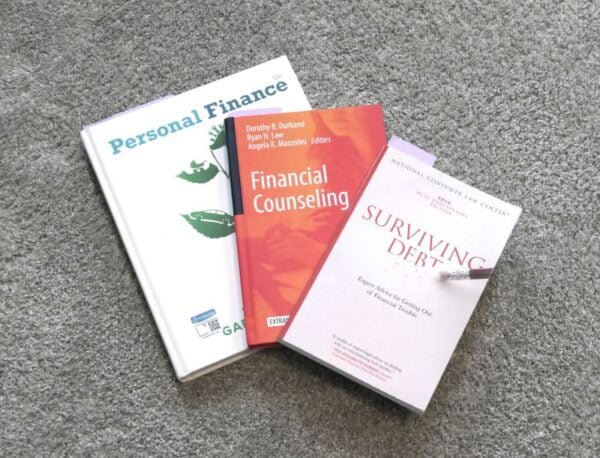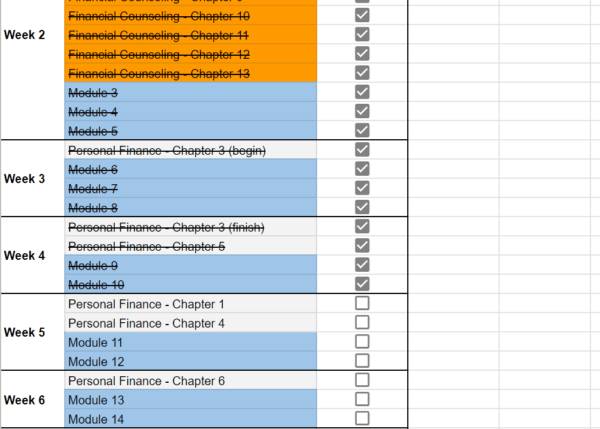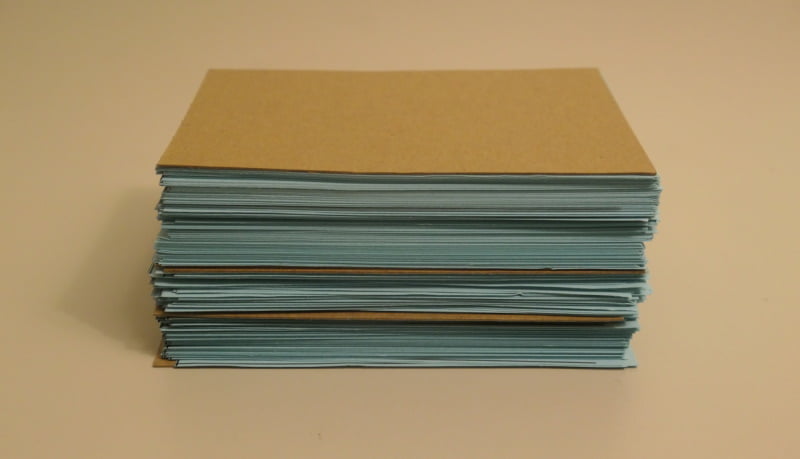I share my experiences preparing for and subsequently taking the AFC exam, including lessons learned along the way.
More in this series:
Earlier this year, I successfully completed 1,000 hours of relevant financial counseling experience, which was one of the big prerequisites for earning the Accredited Financial Counselor® (AFC®) certification.
After that, only one thing remained: the exam.
(In response to the question I get often: you don’t have to take the exam first. You can get the experience hours before, during, and after the exam. The order makes no difference, as long as you complete them all eventually.)
The exam loomed over me in a different way from the 1,000 experience hours. The hours felt near-unachievable in aggregate but doable in the short term; all I had to do was just do the tasks.
The exam felt exactly the opposite: simple when looked at on the whole, but near-impossible when looking at the day-to-day preparation. How do I prepare for the exam?
Read on to find out what I did.
Note: In case you’re reading to find out what’s on the exam, I’m sorry, Dave, but I’m afraid I can’t do that. It wouldn’t be fair, and besides, we all sign an ethics attestation saying that we won’t talk about the exam. But everything else, including how I studied for it, is fair game.

Table of Contents
Do I even study?
I have to admit that there was part of me that seriously considered just going in and taking the exam without studying.
I figured there was a chance that my experience in financial services, plus any acquired know-how in standardized tests, might just be all I needed to pass. I’ve always felt good at standardized tests, and I knew that this was a 165 question multiple-choice exam. What if I just winged it?
I decided against this for a few reasons:
- While I could retake the exam, it wasn’t free, and it felt like a bit of an expensive thing to risk.
- I was hoping to get something out of the studying process, not just a passing grade. I like this material and want to learn as much about financial matters as I can. Why skip that?
In the end, I just thought it would be a more rewarding process to go through and study for the exam.
Also, here’s an interesting statistic. According to the AFCPE, the average pass rate for first-time test takers hovers around 70%, while the average pass rate for repeat test takers is around 40%.
Why that is, I have no idea. The test isn’t harder the second time around, obviously. The only explanation I could come up with was that if you weren’t able to pass it the first time, it may be less about how much you studied, and more about how well you do at tests in general.
So even though I knew it was kind of silly, I wanted to be fully prepared for the test with the 70% outcome, rather than do a retake where I was statistically less likely to pass.
How could I study?
Then there was the little matter of how to actually prepare for the exam.
And here, I’m going to get out of the way the single most frustrating part of this entire process. There are no practice tests for the AFC® exam.
Now, it had been a while since I’d taken a standardized test, but where I come from, when you want to take the SAT or GRE or whatever, you go get a book which contains a study guide and at least one practice test in the back, one that’s based on questions used in previous tests. That way, you get a sense for what the exam is like.
But there is no such book or site or anything for the AFC®. So I had to walk into the test not ever quite knowing what the test would look like.
Now, I did have some clues. I knew the overall format of the exam, as that was in the AFC® Exam Guide. I knew the number of questions. I knew what the subject matter categories were and how many questions were from each category.
I also had access to an online e-learning course with over 30 modules of content, each with a 10 question quiz at the end.
But I was repeatedly informed that these questions were not to be considered representative of what was on the exam. Which led me back to the same question: “So how do I find out what’s actually on the exam?”
The only answer was: to take it.
How it started
As part of my candidacy, I was sent three textbooks. This was pretty overwhelming (do I just read the textbooks from cover to cover?) and it took me a while to figure out how to break it down.

Eventually, I found two study plans online, an 8-week and 16-week study plan. These broke down the material into manageable chunks and, more importantly, took away the decisions from me. All I had to do was do what the study guide said to do. Read these chapters. Do those online modules. Repeat.
I decided on the 16 week plan, as the 8 week plan seemed a little too intense for me. I feared not that I wouldn’t be able to keep up, but that the pace would be too fast for me to retain anything. And why bother if I wouldn’t remember what I read?
Finally, I got a study buddy. My colleague and friend, Hannah is also on the AFC® path, and we decided to be each other’s accountability partner for studying.
How it went
I set aside one evening a week to study. For me, just like how Saturday has been my writing day for years, I took Monday as my study night. I found that having a dedicated time for studying was the only way that I was able to keep up. With the 16 week study plan, this turned into a few hours of studying each week.
I also took the original PDF of the study plan and turned it into a spreadsheet with a checklist. Now this might seem silly, but I can’t tell you how satisfying it was to finish a chapter or do a module, and then check that box. Every check made me feel like I was making progress!

There were definitely things I didn’t know, and that alone probably justified the whole process to me right there. But that also led to the hardest part: I had to learn the study material’s “correct answers”, even when they differed from mine.
For example, one of the textbooks stated that the debt avalanche was superior to the debt snowball, full stop. Now, I’ve found the opposite to be true in most cases, but that didn’t matter for the test. I had to compartmentalize when the material believed different things from me.
The final push (and flashcards)
Week 16 of the 16 week study plan just said “Review”. But I had a plan for that too.
As I mentioned before, every online module had a 10 question quiz at the end of it. I averaged about 9 out of 10 correct on each of the modules, which had me feeling pretty good. But this was right after reading the material. How would it be a few months later?
In order to get easier access to these questions and to record how I did, I dumped each quiz into a Google Doc, and highlighted the correct answer (and my incorrect answer if I got it wrong).
I thought that they would make really good flashcards.
Everyone knows that flashcards work. So, why not make them for this exam?
The problem was the sheer mass of content: over 300 questions. They say that a best practice on flashcards is writing them out longhand, but there was zero way I was going to do that.
I looked around and found a bunch of online flash card makers, but they all wanted me to create an account and to charge me for the basic features I wanted.
In the end, I found a vestige from the early internet, back before everything was monetized. A site where you could just create flashcards. Nothing more, nothing less.
Actually, it did one thing more: It created a PDF of them, which could then be printed and cut out.
So that’s exactly what I did. I spent an hour or two copy and pasting the 300+ questions into the form, and then generated an 82-page PDF.
I then went off to Kinko’s FedEx Office and had them printed and cut them down.
The results were…a little intimidating. But they worked, and I had flashcards!

Scheduling the AFC exam
The AFC® exam outsources the testing to an exam company, PSI. They have locations all over the country, and there was one right in Portland, in a nondescript office park.
Hannah and I had done all our studying together, but since we live in different parts of the country, we couldn’t really take the exam together. So we did the next best thing: we scheduled the exam on the same date, as close to the same time as time zones would allow.
Exam day
On exam day, I showed up to the office park. The place was as bland and generic as you could imagine. Long, empty corridors, drop-ceilings, the whole dystopian works.
I signed in, and was told to empty my possessions into a bag, which was then sealed until after I completed my exam. You can bring basically nothing into the test, only a basic calculator and a pencil and scratch paper. Obviously, phones aren’t allowed.
I walked in to a mostly empty room. Out of 18 or so cubicles, only six were being used.
I got on my computer and got to work.
Now, as I said above, I’m not going to describe anything about the exam itself, but I will describe my experience in that room.
First of all, I started out slowly and deliberately, and very quickly realized that I wasn’t going to finish the exam if I kept up at that rate. We had three hours to do 165 questions, and that’s roughly one minute per question, but twenty minutes in, I was only ten questions done.
So I changed speeds, and marked questions I wasn’t sure about to come back to later.
I can’t say enough good things about eliminating possible answers, and writing them down. For many questions, I would write down “A B C D” and physically cross the ones off that I knew were wrong. You think you can do this in your head, but believe me, it’s better to do it longhand. Trust me on this.
I answered most questions on the first pass in maybe 90 minutes or so, and then went back to return to the questions I wasn’t sure about. This took about a half hour more.
I don’t have evidence to back this up, but I believe that many people who fail the test may have failed at proper time management, rather than lack of knowledge. There was one question which, to me, looked so long and involved that I basically rejected it outright. After I had gotten through all the other questions and had some time to kill, I took a stab on the question, spent a half-hour on it, and still couldn’t get the right answer. That could single-handedly torpedo a test for someone else.
Finally, what I will say is this: multiple choice word problems aren’t inherently hard, but when you put 165 of them together in a row, the effect is diabolical. After a while, I felt like my brain was turning to mush. All the words just started to blend together in my mind, and it took all I had to stay focused for long enough to give everything an answer.
The result
With about twenty minutes to spare, I realized that I didn’t have anything more in me. So I stood up and staggered out of the testing room.
The man freed my belongings from the zipped bag, and did some things on his computer. After a minute, a page printed out of a printer. He stood up and, totally stone-faced, said, “here you go.”
Now, you have to realize that my brain was fried by this point. What he gave me was a report of how I did on the exam, but it was so dense and full of 10-point text that I found myself totally unable to parse it for a minute or so. I just stared at the page, my eyes all but crossing.
I wanted a page with a large green checkbox or a large red X on it to show how I did. I just did word problems for the last three hours! Don’t make me do any more work.
But finally, once my eyes refocused, I saw, in tiny print, in the middle of the page, the only words that mattered.
“Congratulations, you passed.”
Aftermath
Hannah and I jumped on a Zoom call to debrief and celebrate. (I don’t want to steal her thunder or anything, but I can’t not mention that she passed too.) We toasted to a job well done, compared notes at some of the questions we remembered, raged at some of the questions we hated, and she was even able to explain that question I spent a half hour on and never got right.
But no matter. I passed my exam, and therefore, achieved the final hurdle to my AFC® certification.
A few days later, after submitting my final paperwork, I received an email saying that my certification was approved.
I’m now an Accredited Financial Counselor®. Hooray!
And I’ve got the paper to prove it too. Look here!
Final words
So now I can finally stop saying that I’m an “AFC® Candidate”. I can drop the “Candidate” part.
How does it feel? Well, it feels amazing.
Is anything markedly different? Well no, but I didn’t expect that.
As far as my practice is concerned, it’s unclear whether it would ever have an effect. After all, I’ve been coaching people for a decade now. They all didn’t seem to care that I didn’t have letters after my name.
The question is whether other people, the ones who might stay away because I lacked credentials, will give me a look now.
All in all, I feel very accomplished after going through this whole process over the past two and a half years. I learned a fair amount too.
But now, it’s onward to the next challenge, and to get back to the real work, helping my clients manage their financial lives, make more money, feel less anxious, and become as wealthy as they desire.
Going forward, it’ll still be me, just with letters after my name.



6 Comments
AnnaNotAFinancePro
Congratulations 🙂
Mike Pumphrey
Thank you, Anna!
Carole
That’s wonderful news, Mike. Congratulations! All of your hard work paid off. An amazing job.
Tara
Hi Mike
Thanks for sharing. I am studying for the AFC and your blog is a god-sent gift.Can you share the 16 week plan please?
Mike Pumphrey
Thanks so much for the kind words Tara! Please send me an email or a note through my contact form, and I’ll share with you what I have (though no promises on whether it’s still accurate today).
KB
Hi Mike! I’m a little late to the party on this one but I too would like a copy of the 16 week plan please.